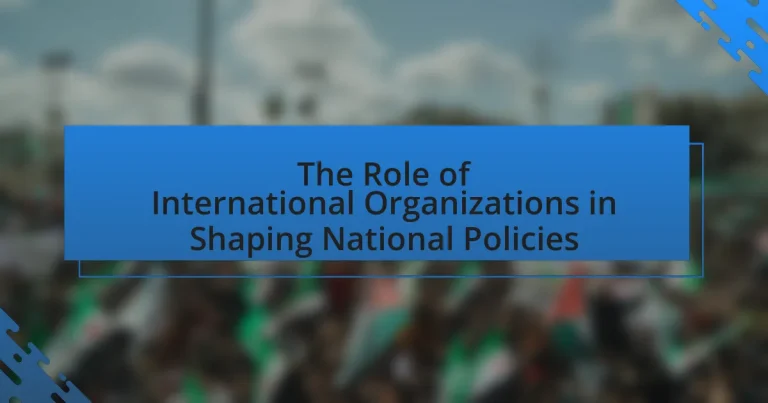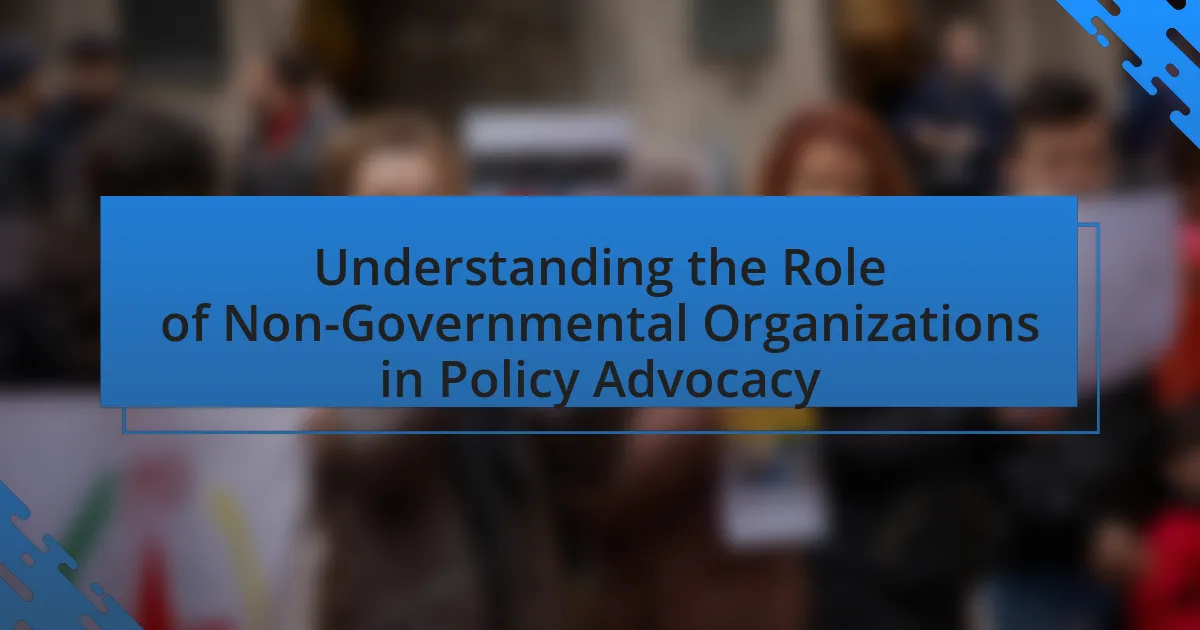International organizations, such as the United Nations, World Bank, and International Monetary Fund, play a pivotal role in shaping national policies by providing frameworks for cooperation, setting international standards, and influencing member states through recommendations and funding. They impact national policy-making through mechanisms like diplomacy, economic incentives, and normative frameworks, compelling countries to align their domestic policies with global norms. The article explores the various types of international organizations, their functions, and the challenges they face in influencing national policies, including issues of sovereignty and differing national interests. It also highlights successful case studies and best practices for nations to effectively engage with these organizations to achieve better policy outcomes.
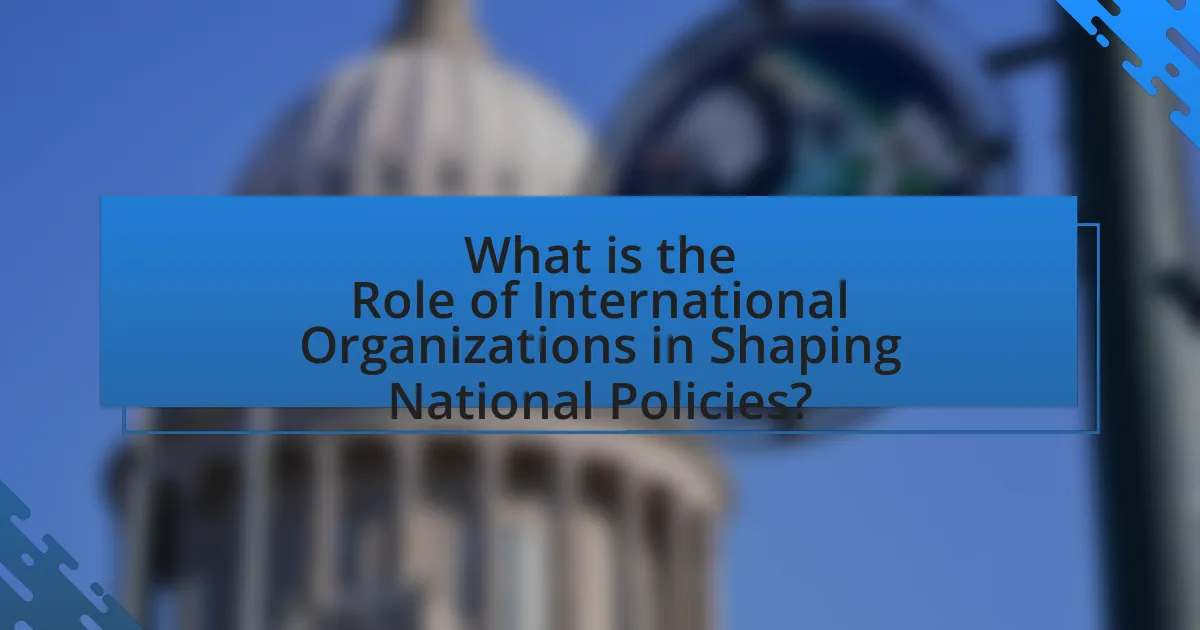
What is the Role of International Organizations in Shaping National Policies?
International organizations play a crucial role in shaping national policies by providing frameworks for cooperation, setting standards, and influencing member states through recommendations and funding. These organizations, such as the United Nations, World Bank, and International Monetary Fund, facilitate dialogue among countries, enabling them to align their policies with international norms and practices. For instance, the World Bank’s funding often comes with stipulations that require countries to implement specific economic reforms, thereby directly impacting national policy decisions. Additionally, international treaties and agreements, such as the Paris Agreement on climate change, compel nations to adopt policies that address global challenges, illustrating how international organizations can drive national policy changes through collective commitments and accountability mechanisms.
How do international organizations influence national policy-making?
International organizations influence national policy-making primarily through the provision of funding, technical assistance, and the establishment of international norms and standards. For instance, organizations like the World Bank and the International Monetary Fund often condition financial aid on the implementation of specific policy reforms, thereby directly impacting national agendas. Additionally, international treaties and agreements, such as those facilitated by the United Nations, create frameworks that countries must adhere to, influencing domestic legislation and policy priorities. This influence is evident in areas such as environmental policy, where international agreements like the Paris Agreement compel nations to align their policies with global climate goals.
What mechanisms do international organizations use to exert influence?
International organizations exert influence through mechanisms such as diplomacy, economic incentives, and normative frameworks. Diplomacy involves negotiations and dialogue to foster cooperation among member states, exemplified by the United Nations facilitating peace talks. Economic incentives include financial aid and trade agreements that encourage compliance with international standards, as seen in the World Bank’s conditional loans promoting economic reforms. Normative frameworks establish guidelines and standards that shape state behavior, illustrated by the World Health Organization’s influence on global health policies through its recommendations and guidelines. These mechanisms collectively enable international organizations to shape national policies effectively.
How do member states respond to the influence of international organizations?
Member states respond to the influence of international organizations by aligning their national policies with international norms and standards. This alignment often occurs through the adoption of treaties, participation in multilateral negotiations, and incorporation of international guidelines into domestic legislation. For instance, countries that are members of the World Trade Organization (WTO) adjust their trade policies to comply with WTO agreements, which aim to promote free trade and reduce tariffs. Additionally, member states may engage in diplomatic dialogue and capacity-building initiatives facilitated by international organizations to enhance their governance frameworks and policy effectiveness. This response is evident in the way countries implement the Sustainable Development Goals (SDGs) set by the United Nations, demonstrating a commitment to global objectives while addressing local priorities.
Why are international organizations important in global governance?
International organizations are crucial in global governance because they facilitate cooperation among states, promote peace, and address transnational issues. These entities, such as the United Nations and the World Trade Organization, provide platforms for dialogue, negotiation, and conflict resolution, which are essential for maintaining international stability. For instance, the United Nations has played a significant role in mediating conflicts and establishing peacekeeping missions, evidenced by its involvement in over 70 peacekeeping operations since its inception in 1945. Additionally, international organizations help set global standards and norms, influencing national policies on issues like human rights, environmental protection, and trade regulations, thereby shaping the behavior of states in the international system.
What are the key functions of international organizations in governance?
International organizations play crucial roles in governance by facilitating cooperation among states, providing platforms for dialogue, and establishing norms and standards. They help in conflict resolution through mediation and peacekeeping efforts, as seen in the United Nations’ peacekeeping missions, which have been deployed in various regions to maintain stability. Additionally, these organizations contribute to policy formulation by offering technical assistance and expertise, exemplified by the World Health Organization’s guidance during health crises. Furthermore, they monitor compliance with international agreements, ensuring accountability among member states, as demonstrated by the International Atomic Energy Agency’s inspections of nuclear facilities.
How do international organizations facilitate cooperation among nations?
International organizations facilitate cooperation among nations by providing a structured platform for dialogue, negotiation, and collaboration on global issues. These organizations, such as the United Nations and the World Trade Organization, establish rules and norms that guide member states in their interactions, thereby promoting stability and predictability in international relations. For instance, the United Nations facilitates peacekeeping missions and conflict resolution efforts, which have been instrumental in reducing tensions and fostering cooperation in regions like the Balkans and Africa. Additionally, international organizations often provide technical assistance and resources to help countries implement policies that align with global standards, such as environmental regulations or human rights protections, further enhancing collaborative efforts among nations.
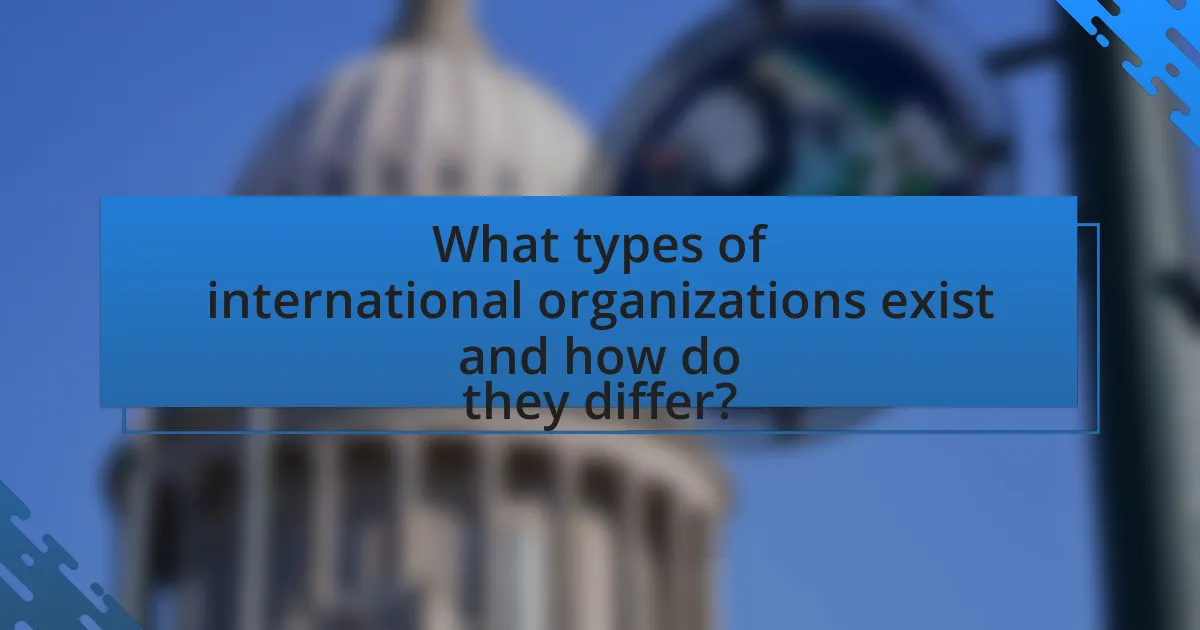
What types of international organizations exist and how do they differ?
International organizations can be categorized into three main types: intergovernmental organizations (IGOs), non-governmental organizations (NGOs), and hybrid organizations. IGOs, such as the United Nations and the World Trade Organization, are formed by member states and focus on issues like security, trade, and development. NGOs, like Amnesty International and Greenpeace, operate independently of governments and address social, environmental, and humanitarian issues. Hybrid organizations, such as the Global Fund, combine elements of both IGOs and NGOs, often involving public-private partnerships to tackle global challenges. These distinctions are based on their membership, governance structures, and primary objectives, which influence their roles in shaping national policies.
What are the main categories of international organizations?
The main categories of international organizations are intergovernmental organizations (IGOs), non-governmental organizations (NGOs), and multinational corporations (MNCs). IGOs, such as the United Nations and the World Trade Organization, are formed by member states to address issues of common interest and facilitate cooperation. NGOs, like Amnesty International and the Red Cross, operate independently from governments and focus on humanitarian, environmental, or social issues. MNCs, such as Apple and Shell, engage in international business and can influence policies through economic power and lobbying. These categories play distinct roles in shaping national policies by providing platforms for dialogue, advocacy, and resource mobilization.
How do intergovernmental organizations differ from non-governmental organizations?
Intergovernmental organizations (IGOs) differ from non-governmental organizations (NGOs) primarily in their membership and purpose. IGOs are formed by sovereign states and operate on an international level to facilitate cooperation on issues such as security, trade, and environmental policy, exemplified by entities like the United Nations and the World Trade Organization. In contrast, NGOs are independent organizations that operate without government affiliation, focusing on specific social, humanitarian, or environmental issues, such as Amnesty International or Greenpeace. The distinction is further highlighted by IGOs having formal authority and decision-making power among member states, while NGOs typically advocate for change and influence policy without formal governmental authority.
What roles do regional organizations play compared to global organizations?
Regional organizations primarily focus on addressing specific regional issues and fostering cooperation among member states, while global organizations tackle broader, worldwide challenges. For instance, the European Union (EU) facilitates economic integration and political collaboration among European countries, directly influencing national policies through regulations and directives. In contrast, the United Nations (UN) addresses global issues such as peacekeeping, human rights, and climate change, impacting national policies through international treaties and resolutions. This distinction highlights that regional organizations often provide tailored solutions and immediate responses to localized concerns, whereas global organizations aim for comprehensive frameworks that address universal challenges.
How do international organizations set agendas for national policies?
International organizations set agendas for national policies primarily through the establishment of norms, standards, and frameworks that member states are encouraged to adopt. These organizations, such as the United Nations and the World Health Organization, influence national policy by providing guidelines, facilitating dialogue, and promoting best practices among countries. For example, the World Health Organization’s Framework Convention on Tobacco Control has led many countries to implement stricter tobacco regulations, demonstrating how international agreements can shape domestic legislation. Additionally, international organizations often provide funding and technical assistance, which incentivizes countries to align their policies with global standards.
What processes do international organizations use to prioritize issues?
International organizations prioritize issues through systematic assessment frameworks that evaluate global challenges based on urgency, impact, and feasibility. These frameworks often involve stakeholder consultations, data analysis, and alignment with strategic goals, ensuring that the most pressing issues receive attention. For instance, the United Nations employs the Sustainable Development Goals (SDGs) as a guiding framework, which helps in identifying priority areas by analyzing socio-economic data and engaging member states in discussions. This structured approach allows organizations to focus resources effectively and address critical global issues, such as poverty and climate change, based on empirical evidence and consensus among member nations.
How do these agendas impact national policy decisions?
International agendas significantly influence national policy decisions by establishing frameworks that guide member states’ actions. For instance, organizations like the United Nations and the World Trade Organization set international standards and norms that countries often adopt to align with global expectations. This alignment can lead to changes in domestic laws and regulations, as seen in the adoption of environmental policies influenced by international climate agreements such as the Paris Agreement. Additionally, countries may adjust their policies to secure funding or support from these organizations, demonstrating a direct correlation between international agendas and national policy formulation.
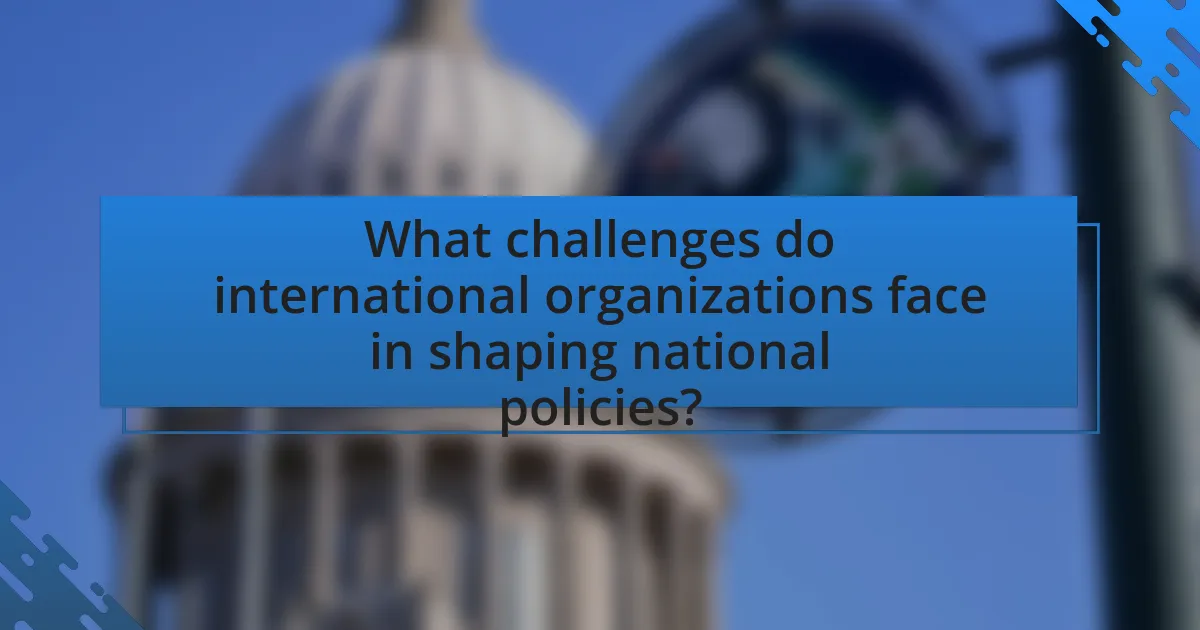
What challenges do international organizations face in shaping national policies?
International organizations face significant challenges in shaping national policies, primarily due to issues of sovereignty, differing national interests, and varying levels of compliance. Sovereignty limits the extent to which international organizations can influence domestic policy, as nations prioritize their own laws and regulations over external recommendations. Additionally, national interests often diverge from the goals of international organizations, leading to resistance or selective adoption of policies. For instance, during the Paris Agreement negotiations, countries like the United States expressed concerns over economic impacts, which influenced their commitment levels. Furthermore, compliance varies widely; some nations may lack the capacity or political will to implement international guidelines effectively, as seen in the case of the World Health Organization’s recommendations during health crises. These factors collectively hinder the ability of international organizations to enact cohesive and effective policy changes at the national level.
What are the limitations of international organizations in influencing national policies?
International organizations face significant limitations in influencing national policies due to issues of sovereignty, varying national interests, and resource constraints. Sovereignty allows nations to prioritize their own laws and regulations over international recommendations, often leading to resistance against external influence. Additionally, national interests can diverge from the goals of international organizations, as countries may prioritize economic, political, or cultural factors that conflict with international agendas. Resource constraints, including financial and human capital limitations, can hinder the effectiveness of international organizations in implementing policies or providing support to member states. These factors collectively restrict the ability of international organizations to enact meaningful changes in national policy frameworks.
How do political, economic, and cultural factors affect their effectiveness?
Political, economic, and cultural factors significantly affect the effectiveness of international organizations in shaping national policies. Political stability and governance structures determine how receptive a country is to international influence; for instance, democratic nations often engage more constructively with international organizations compared to authoritarian regimes, which may resist external pressures. Economically, the level of development and resource availability influences a nation’s ability to implement policies suggested by international organizations; countries with stronger economies are generally more capable of adopting and sustaining reforms. Culturally, societal values and norms can either facilitate or hinder the acceptance of international guidelines; for example, nations with a strong emphasis on sovereignty may prioritize local customs over international recommendations. These factors collectively shape the degree to which international organizations can effectively promote policy changes within member states.
What role does national sovereignty play in the influence of international organizations?
National sovereignty significantly limits the influence of international organizations on member states. Sovereignty allows nations to maintain control over their domestic affairs, often leading to resistance against external pressures from organizations like the United Nations or the World Trade Organization. For instance, countries may choose to ignore or reject international agreements that conflict with their national interests, as seen in the case of the United States withdrawing from the Paris Agreement on climate change in 2017, citing national sovereignty concerns. This dynamic illustrates that while international organizations aim to promote cooperation and policy alignment, the principle of sovereignty remains a powerful factor that can hinder their effectiveness and authority in shaping national policies.
How do international organizations adapt to changing global dynamics?
International organizations adapt to changing global dynamics by reforming their structures, policies, and strategies to address emerging challenges. For instance, the United Nations has established new agencies and initiatives, such as the Sustainable Development Goals, to respond to global issues like climate change and inequality. Additionally, organizations like the World Trade Organization have updated trade agreements to reflect shifts in economic power and technological advancements, ensuring that they remain relevant in a rapidly evolving global landscape. These adaptations are often driven by the need to maintain legitimacy and effectiveness in addressing the concerns of member states and the international community.
What strategies do international organizations employ to remain relevant?
International organizations employ strategies such as adapting to global challenges, enhancing collaboration with member states, and leveraging technology to remain relevant. By addressing pressing issues like climate change and public health, organizations like the United Nations and World Health Organization demonstrate their adaptability and responsiveness to contemporary needs. Furthermore, fostering partnerships with governments and non-governmental organizations allows these entities to amplify their influence and effectiveness in shaping national policies. The integration of digital tools and data analytics enhances their operational efficiency and outreach, ensuring they remain at the forefront of international discourse.
How do they address emerging global issues and crises?
International organizations address emerging global issues and crises through coordinated efforts, policy frameworks, and resource mobilization. For instance, the United Nations (UN) plays a pivotal role in crisis response by deploying peacekeeping missions and facilitating humanitarian aid, as seen during the Syrian refugee crisis where it coordinated assistance for millions displaced by conflict. Additionally, organizations like the World Health Organization (WHO) respond to health emergencies, exemplified by their leadership during the COVID-19 pandemic, where they provided guidelines and support to countries for managing public health responses. These actions demonstrate how international organizations leverage their authority and resources to effectively tackle global challenges.
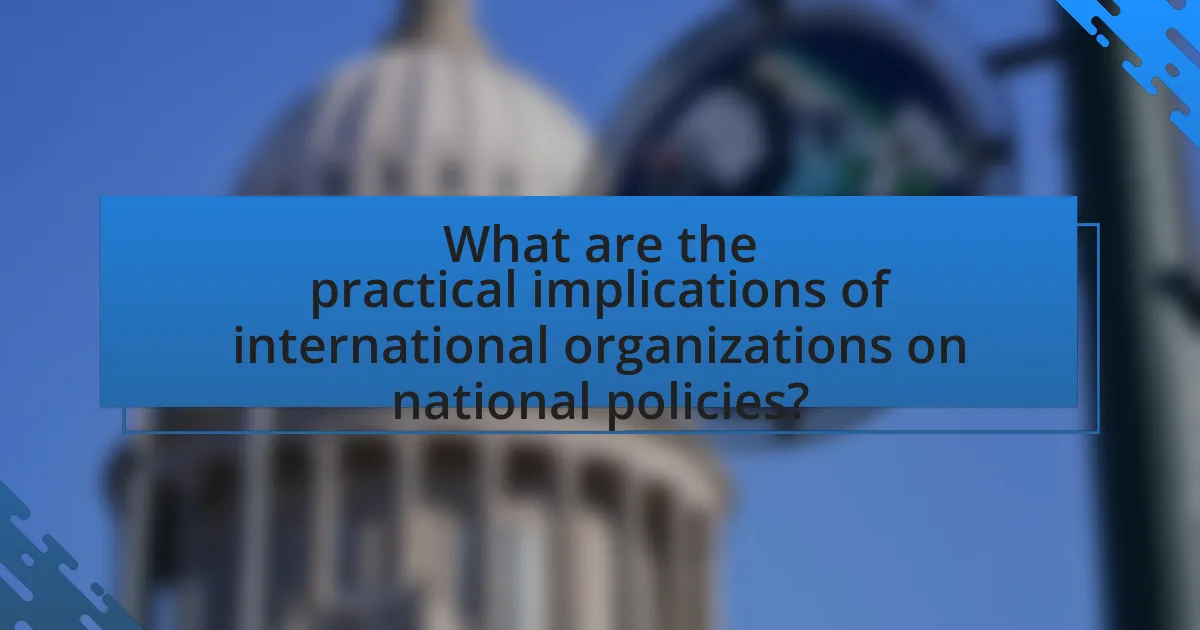
What are the practical implications of international organizations on national policies?
International organizations significantly influence national policies by providing frameworks for cooperation, setting standards, and facilitating resource allocation. For instance, the World Health Organization (WHO) has shaped national health policies through guidelines on disease prevention and response, particularly evident during the COVID-19 pandemic when countries adapted their health strategies based on WHO recommendations. Additionally, the International Monetary Fund (IMF) impacts national economic policies by conditioning financial assistance on specific reforms, as seen in various countries that implemented austerity measures in exchange for bailout packages. These organizations also promote best practices and foster dialogue among nations, leading to policy harmonization in areas such as trade, environmental protection, and human rights.
How can countries effectively engage with international organizations?
Countries can effectively engage with international organizations by actively participating in decision-making processes, aligning national policies with international standards, and fostering collaborative relationships. Active participation involves attending meetings, contributing to discussions, and voting on resolutions, which enhances a country’s influence within the organization. Aligning national policies with international standards, such as those set by the World Health Organization or the United Nations, ensures compliance and facilitates cooperation on global issues. Collaborative relationships can be built through partnerships, joint initiatives, and sharing best practices, which strengthen ties and promote mutual interests. For instance, countries that have engaged with the World Trade Organization have seen improvements in trade policies and economic growth, demonstrating the benefits of effective engagement.
What best practices should nations adopt when collaborating with international organizations?
Nations should adopt transparency, effective communication, and mutual respect as best practices when collaborating with international organizations. Transparency ensures that all parties are aware of objectives, processes, and outcomes, fostering trust and accountability. Effective communication facilitates the exchange of ideas and information, which is crucial for aligning goals and strategies. Mutual respect acknowledges the sovereignty and unique contexts of each nation, promoting a collaborative environment. For instance, the United Nations emphasizes these principles in its partnerships, which have led to successful initiatives in areas like health and education, demonstrating the effectiveness of these practices in achieving common goals.
How can nations balance national interests with international commitments?
Nations can balance national interests with international commitments by prioritizing diplomacy and multilateral cooperation. This approach allows countries to negotiate terms that align their domestic goals with global responsibilities, such as climate agreements or trade treaties. For instance, the Paris Agreement on climate change exemplifies how nations can commit to international standards while tailoring their implementation strategies to fit national contexts. By engaging in dialogue through international organizations like the United Nations, countries can find common ground that respects both their sovereignty and collective obligations, thereby fostering a cooperative international environment.
What lessons can be learned from the role of international organizations in policy shaping?
International organizations play a crucial role in shaping national policies by facilitating cooperation, providing expertise, and promoting best practices. One key lesson is that multilateral collaboration enhances policy effectiveness, as seen in the World Health Organization’s response to global health crises, which demonstrates how coordinated efforts can lead to improved health outcomes across nations. Additionally, international organizations often set standards and frameworks, such as the United Nations’ Sustainable Development Goals, which guide national policies towards common objectives, illustrating the importance of shared goals in policy formulation. Furthermore, the influence of international organizations can lead to the adoption of innovative practices, as evidenced by the World Bank’s initiatives in poverty reduction, which have inspired national programs worldwide. These lessons highlight the significance of international organizations in fostering policy alignment and enhancing governance at the national level.
What successful case studies illustrate the impact of international organizations?
Successful case studies illustrating the impact of international organizations include the World Health Organization’s (WHO) response to the Ebola outbreak in West Africa and the United Nations Development Programme’s (UNDP) initiatives in poverty reduction in various countries. The WHO coordinated international efforts that led to a significant decrease in Ebola transmission rates, showcasing its role in global health governance. In the case of the UNDP, its programs in countries like Bangladesh have resulted in a 20% reduction in poverty levels over a decade, demonstrating effective collaboration with local governments to implement sustainable development policies. These examples highlight how international organizations can effectively influence national policies and improve outcomes in health and economic development.
How can nations leverage international organizations for better policy outcomes?
Nations can leverage international organizations for better policy outcomes by actively participating in collaborative frameworks that facilitate knowledge sharing, resource allocation, and standard-setting. For instance, countries can engage with the World Health Organization to adopt best practices in public health, which has been shown to improve health outcomes significantly; countries that implemented WHO guidelines during the COVID-19 pandemic experienced lower transmission rates. Additionally, nations can utilize platforms like the United Nations to negotiate treaties that address global challenges, such as climate change, leading to more effective national policies that align with international standards and commitments. This collaborative approach not only enhances policy effectiveness but also fosters diplomatic relations and shared accountability among nations.
